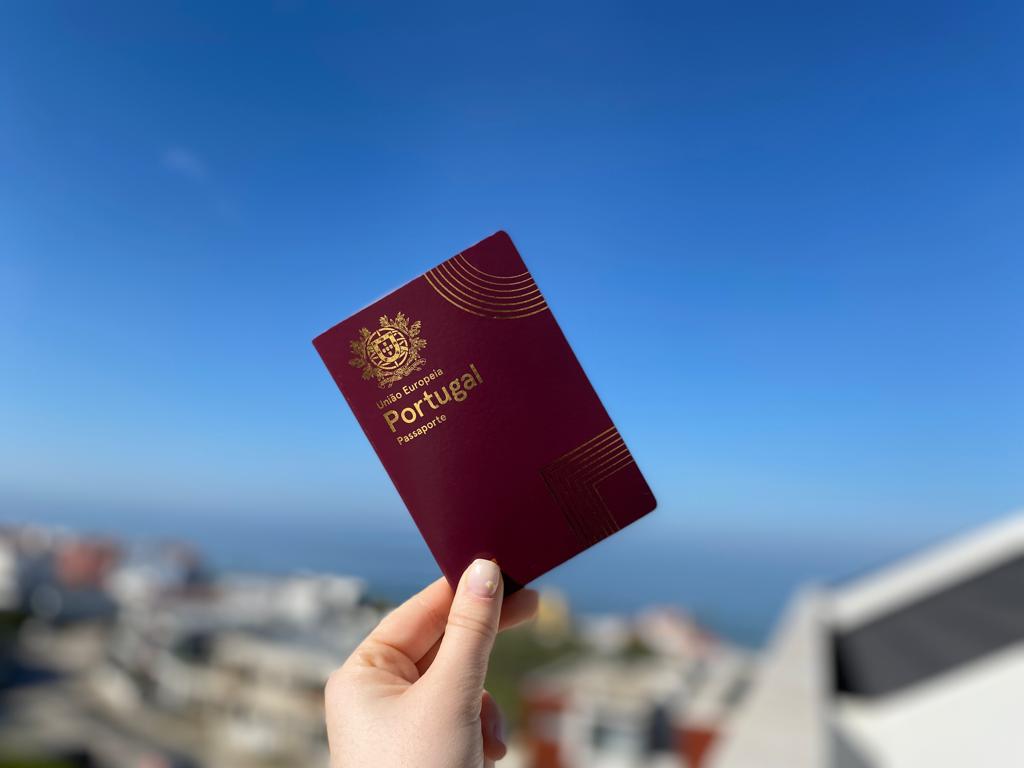When it comes to global freedom, few passports carry more weight than Portugal’s. In fact, it now ranks No. 6 in the world and even No. 3 in some rankings! With the Portuguese passport, you can obtain visa-free access to the Schengen Zone and the ability to live and work anywhere in the EU, free or discounted health care and university within the EU, the ability to purchase land in the EU compared to only apartments or condominiums, and a fast track toward Brazilian citizenship. In contrast, while the U.S. passport remains powerful, it comes with heavier tax burdens and fewer rights abroad. In this article, you will see how the two passports compare in travel, taxation, and lifestyle, and why many Americans are seeking dual citizenship in Portugal.
Table of Contents
1. Global Passport Rankings: Portugal vs. the United States
2. The European Passport Advantage
3. Visa Advantages: Where U.S. Citizens Pay and Portuguese Citizens Do Not
4. Countries That U.S. Citizens Are Barred or Restricted From Visiting
5. Tax and Residency Differences
6. The Brazil Connection – Apple for a Brazilian Passport after One Year
7. The Trade-Offs and Disadvantages
8. Let’s Compare Portugal vs. the United States
1. Global Passport Rankings – Portugal vs. the United States
In 2025, the Portuguese passport ranks among the top five globally, with visa-free or visa-on-arrival access to 186 countries. The U.S. passport is slightly lower, with access to about 180 destinations. For comparison, Singapore ranked No. 1 in at the time of this writing with visa-free or visa-on-arrival access to 192 countries (Henley Passport Index).
While the gap in ranking may look small, the quality of rights attached to EU citizenship, including residence and work authorization across the EU, makes the Portuguese passport more versatile for real life planning and relocation.

2. The European Passport Advantage
The real power of a Portuguese passport comes from EU citizenship. These rights extend well beyond the convenience of travel and will improve your everyday life across Europe.
Schengen Zone and Free Movement
Portuguese citizens can live, work, and travel across the Schengen Area without border checks or time limits. U.S. passport holders are restricted to 90 days in any 180-day period across the entire Schengen area unless they obtain a residence permit. As of October 12, 2025, non-EU citizens will begin requiring fingerprints and facial scans upon entry into the Schengen Area.
Right to Live, Work, and Study Anywhere in the EU
A Portuguese passport grants the right to live and work in any EU or EEA country without a separate work visa. Students benefit from domestic tuition rates instead of higher international fees.
Property Ownership and Investment
EU citizens can buy land or property in the EU often under the same conditions as locals. Americans may face restrictions or different tax treatment in certain markets.
Healthcare, Education, and Social Benefits
- Public healthcare – EU citizens can access public systems that are free or subsidized once resident.
- Education – Many EU universities charge minimal or no tuition for EU citizens.
- Social benefits – Depending on residence and contributions, EU citizens may qualify for pensions, unemployment support, and family benefits.
EHIC – European Health Insurance Card
With the European Health Insurance Card, Portuguese citizens receive necessary state provided care during temporary stays in other EU and EEA countries at local rates, often at little or no cost.
3. Visa Advantages – Where U.S. Citizens Pay and Portuguese Citizens Do Not
Both the U.S. and Portuguese passports provide broad access worldwide. Even so, there are several countries where Americans must pay for visas while Portuguese citizens enter without fees or with simpler procedures.
While both U.S. and Portuguese passports open doors across much of the world, there are still several countries where Americans face visa or entry fees that Portuguese citizens do not. The differences often stem from reciprocity agreements, regional partnerships, or visa-waiver policies tied to the European Union.
In Brazil, Americans once enjoyed visa-free travel, but that changed in April 2025 when Brazil reinstated visa requirements for U.S. visitors. Travelers from the United States must now apply for an electronic visa costing about 80 dollars. Portuguese citizens, however, continue to enjoy visa-free entry for up to 90 days for tourism or business under long-standing agreements between the two countries.
In China, U.S. citizens must obtain a visa before traveling, paying around 140 dollars for a single entry. Meanwhile, Portuguese travelers currently benefit from a temporary visa-free program allowing stays of up to 30 days for tourism, business, or family visits through the end of 2025. This temporary exemption makes China one of the most notable examples where European Union passport holders enjoy smoother and cheaper access than Americans.
Australia also differentiates between the two. U.S. citizens must obtain an Electronic Travel Authority (ETA), which includes a 20-Australian-dollar service charge. Portuguese citizens, as members of the European Union, qualify for a separate electronic visa called the eVisitor, which is entirely free. Both authorizations are digital and easy to apply for, but the small cost difference adds up for frequent travelers.
In Bolivia, the disparity is larger. Americans must apply for a tourist visa, paying 160 dollars whether at the consulate or on arrival. Portuguese citizens, in contrast, can enter visa-free for short tourism stays. This reflects a policy Bolivia reserves for many EU countries but not for the United States.
Finally, The Gambia requires U.S. citizens to pay either 108 dollars for a visa on arrival or up to 200 dollars when applying through an embassy. Portuguese passport holders, however, can stay visa-free for up to 90 days, a privilege extended to several European countries under regional and bilateral agreements. As with many nations in Africa, visa requirements can shift suddenly, so even Portuguese citizens are advised to verify entry rules before traveling.

4. Countries That U.S. Citizens Are Barred or Restricted From Visiting
North Korea
U.S. citizens are prohibited from using a U.S. passport to travel to North Korea without special approval. Portuguese citizens can apply through approved channels, although travel remains highly restricted for all nationalities.
Cuba
General tourism to Cuba is not permitted for U.S. citizens. Travel is limited to licensed categories such as education or journalism. Portuguese citizens can visit for tourism and can apply for a visa known as a Cuba Tourist Card. This electronic visa (e-visa) can be applied for online before travel, though a passport valid for at least six months from the arrival date and a blank passport page are also required.
Broader Sanctions and Restrictions
Countries subject to heightened U.S. sanctions and diplomatic tensions, such as Iran or Syria, often present extra obstacles for U.S. travelers. Portuguese citizens may face different rules that reflect EU policy, which can provide alternative paths in some cases.
5. Tax and Residency Differences
U.S. citizens must file annual tax returns and report worldwide income regardless of where they live. Portuguese citizens only pay Portuguese tax if they are tax resident in Portugal for that year. Non residents generally do not file Portuguese returns unless they have Portuguese source income. This difference reduces compliance burdens and offers more flexibility for mobile EU citizens. Keep in mind that if you hold a U.S. passport and a Portuguese passport, you will still need to file U.S. Tax returns even if you are not resident.
6. The Brazil Connection – Apply for a Brazilian Passport after One Year
Portuguese citizens benefit from a special pathway to Brazilian nationality. Under Brazilian law for citizens of Portuguese speaking countries, it is possible to apply for Brazilian citizenship after one year of legal residence in Brazil, subject to meeting the legal criteria. This creates a unique bridge between Europe and South America. For U.S. citizens, standard naturalization timelines require substantial investment or foreign nationals must usually reside in Brazil legally and continuously for four years before applying
Another advantage of gaining Brazilian citizenship through this pathway is automatic access to the Mercosur trade bloc (member countries), which includes Argentina, Uruguay, Paraguay, and several associate members across South America. As a Brazilian citizen, you can live, work, and study freely in Mercosur member countries without needing a work visa.
The Mercosur Residence Agreement extends its privileges beyond full members to include Chile, Colombia, Ecuador, and Peru as associate participants. Together, they form a nine-nation area where citizens can gain residency through a straightforward process that requires only proof of nationality and a clean criminal record.
This expanded mobility offers Portuguese citizens who acquire Brazilian nationality a unique dual reach: full access to the European Union and much of South America, connecting two of the world’s largest regional markets and cultural spheres.

7. The Trade-Offs and Disadvantages
While there are numerous advantages to holding a Portuguese passport, there are also some disadvantages. Average salaries in Portugal and parts of Europe are lower than in the United States. European housing tends to be smaller and more expensive per square meter. In addition, many EU countries have higher income taxes and social contributions, with fewer deductions for small businesses. Paperwork, in person procedures, and language barriers can also slow things down. Finally, extended time abroad or renunciation can affect access to certain American programs and advantages.
8. Let’s Compare Portugal vs. the United States
| Category | Portuguese Passport 🇵🇹 | U.S. Passport 🇺🇸 |
|---|---|---|
| Global Ranking (2025) | Top five, 186 destinations | Top ten, 180 destinations |
| Visa Fees, Brazil | Visa-free up to 90 days | Visa required, approx. USD 80.90 |
| Visa Fees, China | Temporary visa-free entry up to 30 days (through 2025) | Visa required, approx. USD 140 |
| Visa Fees, Australia | eVisitor visa (subclass 651) — free of charge | Electronic Travel Authority (subclass 601), AUD 20 service fee |
| Visa Fees, Bolivia | Visa-free short stays | Tourist visa required, USD 160 |
| Visa Fees, The Gambia | Visa-free up to 90 days | Visa on arrival USD 108 or embassy USD 200 |
| Free Movement in Schengen | Unlimited stay and work | 90 days in any 180 day period |
| Right to Work in EU | Yes, all EU and EEA states | No, requires visa or permit |
| Healthcare Access | Public systems + EHIC coverage | Private, Employee-sponsored, Medicare or Medicaid (in the U.S.) or travel insurance |
| University Tuition in EU | Domestic or low-cost tuition | International student rates |
| Taxation | Only if Portuguese tax resident | Global taxation + annual filing |
| Property Ownership in EU | Equal rights with locals | Restrictions in some markets |
| Eligibility for Brazilian Citizenship | Possible after 1 year residence | Typically 4 years or investment |
| Average Salaries | Lower | Higher |
| Housing Size | Smaller and denser | Larger, more spacious |
| Tax Deductions for Businesses | Limited | More extensive |
| Government Bureaucracy | Moderate to high | Varies by state |
| Travel Restrictions (Cuba and North Korea) | No Portuguese ban for tourism where allowed | Prohibited or restricted by U.S. law |
| Healthcare Reciprocity (EHIC) | Free or subsidized across EU | Not available |
9. Conclusion
The Portuguese passport offers several international advantages. It opens Europe’s borders, simplifies residency and healthcare, and even creates a path to Brazilian citizenship. The U.S. passport remains one of the strongest in the world, but for people seeking the freedom to live and work abroad without heavy compliance burdens, Portuguese citizenship offers broader and more flexible options. For many global citizens, it is a doorway to new opportunities.


